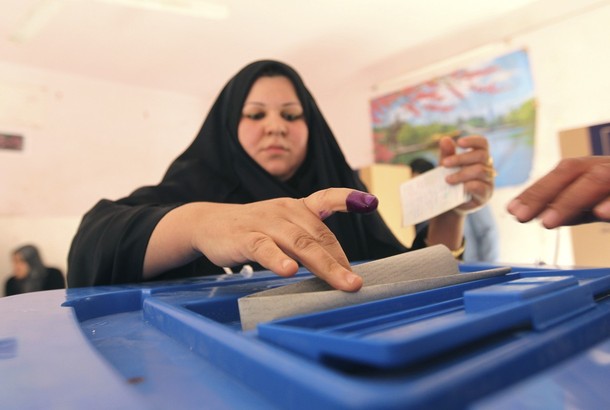
Iraqis went to the polls this weekend in long-anticipated and amidst much analysis and predictions. Given the trillion-plus dollars the United States has dropped in Iraq, our interest in seeing how well we have invested is not surprising. All the analysis, however, is premature, and anyone taking the slim evidence of actions–positive or negative–on the run-up to and conduct of the election is getting badly ahead of themselves. What will the outcome mean? It’s hard to say; coming back and asking the question in a year or so would probably be a better time to ask than now, but in an information soaked world where the instinct is to report and analyze everything in “real time,” such restraint is clearly in short supply.
This past week demonstrates the fervor of the enterprise. Newsweek, for instance, ballyhooed the voting in its lead article as “The Rebirth of a Nation,” suggesting this was the first step to the Iraqi democracy that George W. Bush promised in November 2003, when he expounded, “Iraqi democracy will succeed. . . . The establishment of a free Iraq in the heart of the Middle East will be a watershed event in the global democratic revolution.” The story led with that quote; five pages later, it concludes describing an Iraq, “for better or worse, democratic or not.”
At the other end of the scales, The Nation sourly predicts the election will lead to further factionalization and conflict in a lead article by Robert Dreyfuss, "Iraq’s New Sectarian Storm Clouds.” The gist of his argument is that the elections will only accentuate and bring to a head the considerable fissures within Iraqi politics.” Who’s right?
Equally predictably, the hype has spread to America’s increasingly dysfunctional domestic politics. Vice President Joe Biden yesterday proclaimed that the successful outcome of the election will serve as proof of the success of Obama administration politics. Former Vice President Richard Cheney quickly grumped in return that Bush should receive our thanks for a “mission accomplished.”
The beat goes on.
All of this is at least partly evidence that the “silly season” of politics is in full bloom, weather patterns in the eastern half of the country over the past couple months notwithstanding. That the Iraqis are holding open and apparently fair elections is a good and positive thing. The outcomes, however, are almost certainly going to disappoint the cheerleaders from either end of the spectrum. They will not, at least immediately, solve any of the deep underlying differences that divide Iraqis and that could, ultimately, cause the country to succeed or fail. There is, for instance, little indication that the electoral efforts have transcended traditional ethnic lines that must be reconciled if Iraq is to prosper. Where are the Kurdish-Sunni, or Shia-Kurdish, or Shia-Sunni coalition parties? Will parties representing the various factions coalesce to form a government? For that matter, how will the outcomes move forward the underlying question of how oil revenues will be distributed? These are vital questions,the answers to which will not be known in any definitive way for months, maybe years, to come.
Is it a good and newsworthy sign that the Iraqi elections have been held? Yes, of course it is. That does not mean, however, that this single–if significant–event allows us to extrapolate far into the future immediately. For now, the most responsible course is simply to note the elections have occurred and then to sit back and see how things unwind. In other words, chill!
Donald M. Snow, Professor Emeritus at the University of Alabama, is the author of over 40 books on foreign policy, international relations and national security topics. This essay was originally published at his blog What After Iraq? Photo credit: Reuters Pictures.
Image: iraq-voting-2010.jpg
